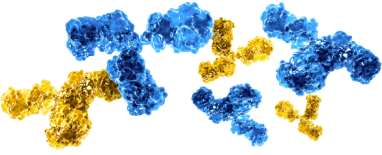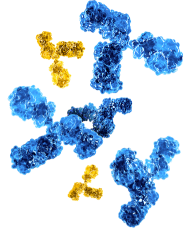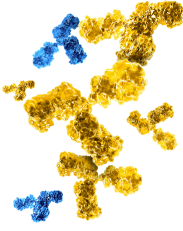-1.jpg?width=575&name=2.1-About-Plasma-&-IVIG.jpg(1)-1.jpg)
About Plasma & IVIG
What is plasma?
Plasma is yellow in color and is the liquid portion of blood in which all blood cells are suspended, representing approximately 55% of total blood volume. Plasma, which is 90% water, is rich in proteins used by the human body for blood clotting and fighting infection.
These proteins account for approximately 7% of plasma’s volume. As plasma contains these valuable proteins, plasma collection and the manufacturing of human plasma-derived therapeutics provide therapeutic benefits for ill patients.
In order to produce plasma-derived therapeutics that can be administered to patients in need, raw material source plasma must be collected from human donors and then manufactured, or fractionated into specialized therapeutic products.
Plasma is collected from healthy donors at FDA-licensed plasma donation centers. To ensure safety of the plasma supply, all plasma collections are tested using FDA-approved methods of Nucleic Acid Testing, or NAT, to exclude the presence of any infectious particles.

Leading the way with innovative immune globulin products
ADMA Biologics is an end-to-end commercial biopharmaceutical company leading a new age of manufacturing, marketing, and commercializing specialty plasma-derived products for the prevention and treatment of infectious diseases in the immune compromised and other patients at risk for certain infections. Our devotion to these underserved populations fuels us, and our hands-on approach to production and development sets us apart.
With three FDA-licensed approved products, including ASCENIV™ (Immune Globulin Intravenous, Human – slra), BIVIGAM® (Immune Globulin Intravenous, Human), and NABI-HB® (Hepatitis B Immune Globulin, Human), ADMA’s mission is to continue to successfully develop and commercialize plasma-derived, human immune globulins targeted to specific patient populations for the treatment and prevention of certain infectious diseases and management of immune compromised patient populations.

Blood & plasma composition
Blood contains
Plasma, red cells, white cells and platelets
Plasma contains
Protein and water
Plasma proteins
- Intravenous immunoglobulin (IVIG) is made from a key therapeutic protein in plasma: Immunoglobulin (IG)
- IG = naturally occurring polyclonal antibodies against bacteria, fungi, and viruses
- Other therapeutic products made from plasma proteins include: albumin, coagulation factors, alpha 1, C 1 etc.
Blood contains
Plasma, red cells, white cells, and platelets
Plasma contains
Protein and water
Plasma proteins
Intravenous immunoglobulin (IVIG) is made from a key therapeutic protein in plasma: Immunoglobulin (IG)
- IG = naturally occurring polyclonal antibodies against bacteria, fungi, and viruses
Other therapeutic products made from plasma proteins include:
- Albumin, coagulation factors, alpha 1, C 1 etc.
ADMA-optimized IG manufacturing process includes validation for all intermediate fractions, maximizing revenue from each L of plasma
Immune globulin is essential to life

Immune globulin (IG) plays a critical role in the function of the immune system.
IG is activated during the body’s response to an infection, presented as an antigen. Without IG, our bodies cannot fight off infections and lose certain abilities to regulate other parts of the immune system.1,2
IG contains antibodies, which are large Y-shaped proteins that are critical to combating a range of pathogens, such as bacteria, viruses, and fungi.1,2
Antibodies in IG can develop in two distinct ways:
A natural infection triggers an immune response.
Patients who convalesce—recover from an illness or an operation—may have plasma that contains antibodies against specific pathogens, thus protecting the patient from reinfection.3
Transfer of antibodies from convalescent patients or immunized donors who have generated active immunity
Vaccines are designed to generate an immune response that produces antibodies to a specific antigen.
Vaccines contain biological products that might mimic a disease-bearing microorganism or some other protein to trigger antibody production.3
Vaccine-mediated active immunity is achieved by administering living or attenuated pathogens
Patients who are unable to generate a protective immune response to infection or vaccination, such as those with primary immunodeficiency (PI), require passive immunity. IG is the only way to provide this passive immunity to protect people from infectious diseases4
What is intravenous immune globulin (IVIG)?
Human immune globulin is composed of antibodies: Y-shaped proteins produced by B cells that are used by the body’s immune system to identify and neutralize foreign objects such as bacteria and viruses. IVIG is IG purified from plasma by a manufacturing process called fractionation and administered intravenously to patients.

Leading the way with innovative immune globulin products
ADMA Biologics is an end-to-end commercial biopharmaceutical company leading a new age of manufacturing, marketing, and commercializing specialty plasma-derived products for the prevention and treatment of infectious diseases in the immune compromised and other patients at risk for certain infections. Our devotion to these underserved populations fuels us, and our hands-on approach to production and development sets us apart.
With three FDA-licensed approved products, including ASCENIV™ (Immune Globulin Intravenous, Human – slra), BIVIGAM® (Immune Globulin Intravenous, Human), and NABI-HB® (Hepatitis B Immune Globulin, Human), ADMA’s mission is to continue to successfully develop and commercialize plasma-derived, human immune globulins targeted to specific patient populations for the treatment and prevention of certain infectious diseases and management of immune compromised patient populations.

There are two types of IGs, standard and hyperimmune

.png?width=230&height=184&name=Rectangle%20417(1).png)
Standard IGs
Standard IGs are manufactured using normal source plasma.

.png?width=230&height=184&name=Rectangle%20418(1).png)
Hyperimmune IGs
Manufactured using plasma obtained from donors who have elevated amounts (high titers) of specific antibodies against a targeted pathogen.
Additionally, IVIG is also used as therapy in a variety of other diseases that do not involve primary or secondary immune deficiencies, such as multiple sclerosis, skin diseases, and asthma. These latter uses are referred to as “off-label” or evidence-based uses because the FDA has not approved their use in these indications and promotion of such uses is not permitted by FDA unless approved by the agency.
IG production starts with source plasma donations
The path to producing IG starts at the source with plasma obtained from donors. Human donors have blood plasma that may already contain a range of polyclonal antibodies that fight a wide array of diseases and infections.4,5
Plasma is the liquid component of blood comprising ~90% water and 10% proteins, one of which is IG. Plasma is collected and obtained from donors using a process called plasmapheresis.
- During this process, plasma is separated from blood cells
- Plasma collection is performed at an FDA-compliant donation site6
.png?width=288&name=shutterstock_1251187498_retouched%201%20(1).png)

Leading the way with innovative immune globulin products
ADMA Biologics is an end-to-end commercial biopharmaceutical company leading a new age of manufacturing, marketing, and commercializing specialty plasma-derived products for the prevention and treatment of infectious diseases in the immune compromised and other patients at risk for certain infections. Our devotion to these underserved populations fuels us, and our hands-on approach to production and development sets us apart.
With three FDA-licensed approved products, including ASCENIV™ (Immune Globulin Intravenous, Human – slra), BIVIGAM® (Immune Globulin Intravenous, Human), and NABI-HB® (Hepatitis B Immune Globulin, Human), ADMA’s mission is to continue to successfully develop and commercialize plasma-derived, human immune globulins targeted to specific patient populations for the treatment and prevention of certain infectious diseases and management of immune compromised patient populations.

Certain plasma donations may contain rare and unique antibody characteristics7
The type of plasma used in IG manufacturing can determine the level of antibody to specific pathogens.6,7
Once plasma is collected from donors, it may be analyzed to identify certain titers – a measure of concentration – for specific antibodies to different infectious diseases.
- Certain specific producers of IG may produce hyperimmune IG, which consistently provides a defined antibody titer level to a specific infectious disease

.png?width=288&name=image(4).png)
Leading the way with innovative immune globulin products
ADMA Biologics is an end-to-end commercial biopharmaceutical company leading a new age of manufacturing, marketing, and commercializing specialty plasma-derived products for the prevention and treatment of infectious diseases in the immune compromised and other patients at risk for certain infections. Our devotion to these underserved populations fuels us, and our hands-on approach to production and development sets us apart.
With three FDA-licensed approved products, including ASCENIV™ (Immune Globulin Intravenous, Human – slra), BIVIGAM® (Immune Globulin Intravenous, Human), and NABI-HB® (Hepatitis B Immune Globulin, Human), ADMA’s mission is to continue to successfully develop and commercialize plasma-derived, human immune globulins targeted to specific patient populations for the treatment and prevention of certain infectious diseases and management of immune compromised patient populations.

The plasma donor pool matters because the type of plasma composition used for immune globulin production determines the level of antibody in the final product to specific pathogens7
- Nicholson LB. The immune system. Essays Biochem. 2016;60(3):275-301.
- Perez EE, Orange JS, Bonilla F, et al. Update on the use of immunoglobulin in human disease: A review of evidence. J Allergy Clin Immunol. 2017;139(3S):S1-S46.
- Centers for Disease Control and Prevention. Understanding how vaccines work. https://www.cdc.gov/vaccines/hcp/conversations/downloads/vacsafe-understand-color-office.pdf.
- Centers for Disease Control and Prevention Vaccines & immunizations. https://www.cdc.gov/vaccines/vac-gen/immunity-types.htm.
- Winters JL. Plasma exchange: concepts, mechanisms, and an overview of the American Society for Apheresis guidelines. Hematology Am Soc Hematol Educ Program. 2012;2012:7-12. doi:10.1182/asheducation-2012.1.7.
- Barahona Afonso AF, João CM. The production processes and biological effects of intravenous immunoglobulin. Biomolecules. 2016;6(1):15. Published 2016 Mar 9.
- Orange JS, Du W, Falsey AR. Therapeutic immunoglobulin selected for high antibody titer to RSV also contains high antibody titers to other respiratory viruses. Front Immunol. 2015;6,431.
.png)